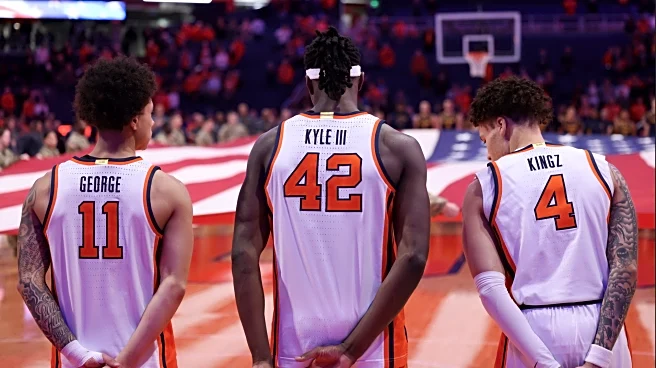What's Happening?
OpenAI has recently launched a new generative AI video tool named Sora 2, which allows users to create videos using various intellectual properties. However, the tool has sparked controversy due to its initial setup, which allowed users to generate content without explicit permission from copyright holders. This led to the creation of videos featuring characters like Mario and Pikachu in unauthorized scenarios. In response to the backlash, OpenAI has revised its policy, requiring companies to 'opt in' for their intellectual properties to be used, rather than 'opt out'. Additionally, OpenAI plans to implement a payment system to share revenue with companies whose IPs are used. Despite the changes, the tool has already faced criticism and potential legal challenges from major media companies.
Why It's Important?
The adjustments to Sora 2 highlight the ongoing tension between technological innovation and intellectual property rights. As generative AI tools become more prevalent, companies like OpenAI must navigate the complex landscape of copyright laws to avoid legal repercussions. The situation underscores the need for clear guidelines and agreements between AI developers and content creators to protect intellectual property while fostering innovation. The outcome of this scenario could set precedents for how AI-generated content is managed and monetized, impacting industries such as gaming, entertainment, and media. Companies that successfully integrate AI tools while respecting IP rights may gain a competitive edge, while those that fail to do so risk legal challenges and reputational damage.
What's Next?
OpenAI's decision to require an 'opt-in' system for IP usage may prompt other AI developers to adopt similar practices, potentially leading to industry-wide standards. Major stakeholders, including media companies and game developers, are likely to monitor the situation closely and may pursue legal action if their intellectual property rights are infringed. The development of a payment system for IP usage could also influence how revenue is shared in the digital content creation space. As AI technology continues to evolve, companies will need to balance innovation with legal compliance to avoid conflicts and foster sustainable growth.
Beyond the Headlines
The Sora 2 controversy raises broader questions about the ethical use of AI in content creation. As AI tools become more sophisticated, the line between creative expression and copyright infringement may blur, challenging existing legal frameworks. This situation highlights the need for ongoing dialogue between technology developers, legal experts, and content creators to establish ethical guidelines and protect creative rights. The case also emphasizes the importance of transparency and accountability in AI development, as companies must ensure their tools are used responsibly and do not inadvertently harm stakeholders.










